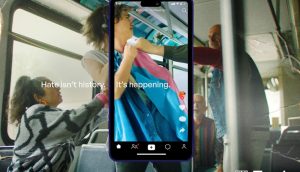If there was an overarching theme to yesterday’s Media Experts’ Digital Day event at the TIFF Bell Lightbox, it was this: keep calm but hurry on, because things are changing fast.
The day-long event was the third annual for Media Experts, and organized to cover many of the hottest areas in digital today: online TV and video, ‘cord-cutting,’ the complexities of cross-platform digital measurement and the rise of mobile. Oh, and the rise of artificial intelligence and the looming spectre of living in The Matrix by 2040.
Keynote speaker Shelly Palmer, host of NBCU’s Live Digital with Shelly Palmer, kicked off the day’s lineup, discussing the changing ways in which consumers engage with digital content and the always-hot topic of ‘cord cutting,’ which he says is not here yet, but most definitely on the horizon.
‘Will it happen overnight? Absolutely not,’ he said. ‘Will it happen to the young, affluent most interesting consumer demo? Absolutely.’
He then set the stage for the theme of the day: be prepared.
‘Prepare for the new without losing sight of where the actual dollars are. You need to figure out how to measure, how to package and how to profit from this new digital world.’
Definitely easier said than done, but ComScore Media Matrix Canada president Brent Bernie took a stab at it in the afternoon in a 40-minute talk that packed a wallop of data for the media-savvy audience to chew on.
Facebook remains a vital force in the social media world he says, but how Canadians use it is changing. In 2007, the average number of visits per month to the site was 31, but has now climbed to 43. Interestingly, he said time spent on Facebook on mobile devices is about equal to that of PCs, with the average mobile user spending 295 minutes per month of Facebook (US data) compared to 274 minutes for PC users.
Social networking may be the fastest-growing category in mobile, he said, but keep your head up because mobile commerce is right behind it. ‘2011 is the year to unlock mobile commerce,’ he said. ‘Mobile’s role in retail is growing alongside phones’ [growing] capabilities.’
He also discussed online video and TV at length, saying that because their scale and potential is so different, online video is unlikely to ‘eat’ TV, but that it also ‘offers the most potential for innovative media placements and packages.’ Recent data from the company indicates that 24% of viewers go back and forth between online and TV, he said, adding that online-only viewers were found to have better responses to ads than TV-only viewers.
Wrapping things up, Bernie offered the following for media agencies to mull: ‘The best companies in the online space learn early by doing things and trying things. So try things, but measure it. Know what’s working and what’s not, and then carry on.’
Spreed‘s David Coleman followed Bernie, kicking off his discussion by emphatically saying that 2011 was not the year of mobile (‘I’ve been hearing this every year for the past five years’) but that companies need to be prepared for that day.
‘I don’t think it’s reasonable to say this is the year of mobile until mobile usage surpasses web usage,’ he said. ‘What I’m here today to say is: be ready.’
One of the greatest opportunities in mobile, he said, is individual targeting: ‘The time for location-based marketing is now.’ However, brands should take care to weigh their strategy carefully in this realm, he said, emphasizing that all brands should have mobile-optimized sites, but that not everyone needs an app. ‘Only build apps if you have a high degree of interaction with your customers on a regular basis.’
The information presented over the course of the day was dizzying, but in the midst of it all, Media Experts executive chairman Mark Sherman offered a glimpse of what might yet come to be: ‘the singularity’ – the day when superintelligence by technology is achieved (surpassing human intelligence) and technological progress becomes so advanced it becomes impossible to predict. To keep up in this world, humans may well have to start implanting brain-computer interfaces in order to keep up.
To that, this writer says: bring it on. Robot brains sound mighty handy for media reporters.























